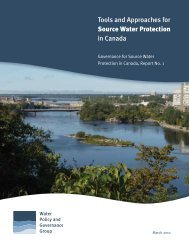Wave Future
Waveof theFuture water policy in western canada - Canada West ...
Waveof theFuture water policy in western canada - Canada West ...
- No tags were found...
Create successful ePaper yourself
Turn your PDF publications into a flip-book with our unique Google optimized e-Paper software.
wave of the future: water policy in western canada | gibbins & sommerfeld<br />
Management and Pricing<br />
“ We need to stop looking for a<br />
silver bullet…Solutions need to<br />
be long-term, local, diversified<br />
and multi-purpose.”<br />
i) Management<br />
Participants stressed that good management is guided by good governance structures.<br />
Overall, there was repeated recognition that water is best managed on a local scale, but<br />
within a provincial or regional framework, both of which should be guided by federal<br />
standards. In most cases in western Canada, the responsibility of water management has<br />
continued to move down to lower and more local levels. This is a positive development,<br />
but experts stressed that the resources needed to manage water on a local scale have not<br />
followed this devolution of power. Many experts agreed that water should be managed on<br />
a local, or regional level and should not be dictated by political boundaries. While political<br />
boundaries are a reality, some suggested that “more centralized, comprehensive agencies<br />
dealing with watersheds” might be better suited to address water challenges. Provincial<br />
governments can step in here to develop watershed management plans.<br />
Throughout the discussions, there was an emphasis on the need for water to be holistically<br />
managed. One expert pointed out that “siloing” water needs (e.g., irrigation, municipalities)<br />
can result in unintended consequences for some users: if one use is diverted to supply another<br />
use, the community as a whole may have a social problem. The solution, then, is for managers<br />
to assess the broad needs of the community, “all of those things that are economically,<br />
physically and socially connected,” and make water-allocation decisions from there.<br />
Many participants felt that politics needs to be removed from decision-making on water<br />
issues. However, this may be more of a wish than a possible reality and many experts<br />
recognized the difficulties of making this separation. Small steps can be taken, though;<br />
once again, the need for a provincial, independent body that is tasked with making water<br />
allocation decisions was reiterated. In Alberta, this is a suggestion that has recently been<br />
made by the Premier’s Council for Economic Strategy. The suggestion of the Council is to<br />
“create the Alberta Water Authority, an independent organization that will ensure optimal<br />
water management across the province.” The Water Authority, would, according to the<br />
report, be responsible for allocation. Creating an independent body to manage water would<br />
likely result in the creation of more long-term plans for water management that would<br />
not change according to political whims.<br />
canada west foundation | www.cwf.ca | august 2011<br />
13




